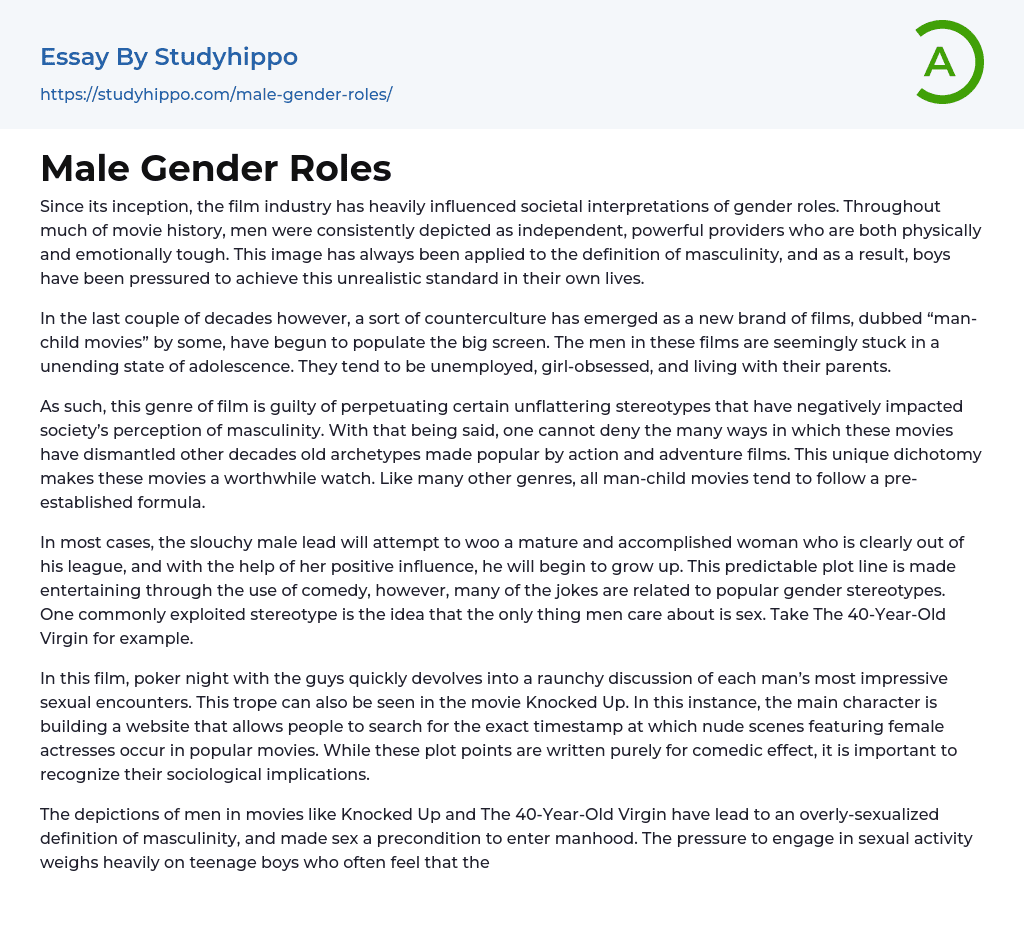The film industry has had a significant impact on society's perception of gender roles, portraying men as strong and independent individuals who possess both physical and emotional strength. This portrayal is closely tied to the notion of masculinity, placing unrealistic pressures on boys to adhere to this ideal. However, there has been a recent shift in cinema with the emergence of "man-child movies" that now dominate theaters.
The male characters in these movies appear to be perpetually trapped in a state of everlasting youth. They frequently lack employment, fixate on romance, and remain dependent on their parents. Consequently, this specific genre of film consistently reinforces detrimental stereotypes that have adversely affected society's perception of masculinity. Nonetheless, it cannot be denied that these films have effectively confronted conventional archetypes typically found in action and adventure movies, thereby contributing to th
...eir widespread appeal. This distinctive combination of factors renders these movies deserving of attention. Similar to numerous other genres, all man-child films adhere to a predetermined formula.
The slouchy male lead attempts to charm a mature and accomplished woman who is clearly above his level, typically leading to personal growth under her positive influence. This familiar plotline provides comedic entertainment, often relying on popular gender stereotypes. A common stereotype exploited is the belief that men are solely focused on sex. The movie "The 40-Year-Old Virgin" serves as a prime illustration of this trope as it depicts a casual poker night among male friends rapidly escalating into explicit discussions about their most memorable sexual encounters. The film "Knocked Up" similarly showcases this stereotype.
The protagonist develops a website featuring the precise timing of nude scenes involving female actresses in popular movies
aiming for humor. However, it is crucial to acknowledge their sociological significance. Films like Knocked Up and The 40-Year-Old Virgin have portrayed males in an overtly sexualized manner, associating masculinity with sex. Consequently, this puts immense pressure on teenage boys who may feel that abstaining from sexual activities will lead to unpopularity or being labeled as homosexual.
According to a survey conducted by Seventeen magazine, 78% of the 1,200 men aged 15 to 22 who were interviewed believe that there is excessive societal pressure to engage in sexual activities. The survey also revealed that 60% of these men admitted to lying about something related to sex, and out of those, 30% confessed to lying about their own sexual experiences. These findings indicate that movies portraying immature and sexually active men can have a negative impact on the self-esteem of young individuals. It is crucial for society to put an end to perpetuating the stereotype that boys who choose not to participate in sexual discussions or activities are not real men. The theme of male friendship is prominently explored in man-child films like Superbad, which features teenage characters.
Seth and Evan, best friends in the film, are about to finish high school and are eager to explore alcohol and sex before college. Through most of the movie, their friendship follows typical stereotypes as they constantly talk about immature topics like women, parties, and drinking. However, towards the end, they overcome obstacles in their friendship and have a remarkably vulnerable moment where they admit their love for each other. This scene, lasting only sixty seconds, is extraordinary as it is rare to see such honest emotions between heterosexual
men in films.
Male vulnerability is often seen as a weakness in society, leading boys to be taught to hide their emotions from an early age. Jonah Hill, who portrays Seth in the film, personally witnessed this phenomenon when showing the movie at colleges. He shared, "The kids went crazy. But then, during the sleeping-bag scene, when Michael and I express our love for each other, those same kids squirmed in their seats in a strange way." These uncomfortable reactions from the audience confirm that societal conditioning has made us uneasy when faced with male vulnerability, and the movie industry must take some responsibility for this.
It is encouraging to see a film, particularly a comedy, willing to confront a stereotype deeply embedded in our culture. The film dares us to rethink the significance of vulnerability in male friendships.
- Woman essays
- Boy essays
- Homosexuality essays
- Masculinity essays
- Sexual Orientation essays
- Girl essays
- Man essays
- Lgbt essays
- Gay essays
- Gender essays
- Gender Identity essays
- Transgender essays
- Human Sexual Behavior essays
- Gender Stereotypes essays
- Gender Roles In Society essays
- Suicide In The LGBTQ essays
- Social Construction of Gender essays
- Anthropology essays
- Audience essays
- Charity essays
- Cultural Competence essays
- Emile Durkheim essays
- Gender Roles essays
- Generation essays
- Globalization essays
- Interpersonal Relationship essays
- People essays
- Race essays
- Social Change essays
- Social Class essays
- Social Movement essays
- Social Science essays
- Social Status essays
- Social Stratification essays
- Society essays
- Sociological Imagination essays
- Sociological Perspective essays
- Sociological Theories essays
- Stereotypes essays
- Web Dubois essays




